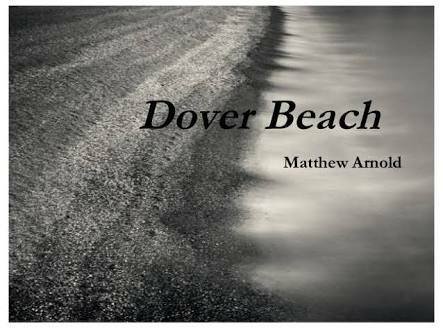
Full Text of the Poem:
The sea is calm tonight.
The tide is full, the moon lies fair
Upon the straits; on the French coast the light
Gleams and is gone; the cliffs of England stand,
Glimmering and vast, out in the tranquil bay.
Come to the window, sweet is the night-air!
Only, from the long line of spray
Where the sea meets the moon-blanched land,
Listen! you hear the grating roar
Of pebbles which the waves draw back, and fling,
At their return, up the high strand,
Begin, and cease, and then again begin,
With tremulous cadence slow, and bring
The eternal note of sadness in.
Sophocles long ago
Heard it on the Ægean, and it brought
Into his mind the turbid ebb and flow
Of human misery; we
Find also in the sound a thought,
Hearing it by this distant northern sea.
The Sea of Faith
Was once, too, at the full, and round earth’s shore
Lay like the folds of a bright girdle furled.
But now I only hear
Its melancholy, long, withdrawing roar,
Retreating, to the breath
Of the night-wind, down the vast edges drear
And naked shingles of the world.
Ah, love, let us be true
To one another! for the world, which seems
To lie before us like a land of dreams,
So various, so beautiful, so new,
Hath really neither joy, nor love, nor light,
Nor certitude, nor peace, nor help for pain;
And we are here as on a darkling plain
Swept with confused alarms of struggle and flight,
Where ignorant armies clash by night.
Summary:
One night, the speaker of "Dover Beach" sits with a woman inside a house, looking out over the English Channel near the town of Dover. They see the lights on the coast of France just twenty miles away, and the sea is quiet and calm.
When the light over in France suddenly fades, the speaker focuses on the English side, which remains calm. He uses imagery to describe the roar of the pebbles being pulled out by the waves. He finishes the first stanza by calling the music of the world an eternal note of sadness.
The next stanza flashes back to ancient Greece, where Sophocles heard this same sound on the Aegean Sea, and was inspired by it to write his plays about human misery.
Stanza three introduces the poem's main point that faith is fading from society like the tide is from the shore. The speaker laments this decline of faith through sad diction.
In the final stanza, the speaker directly addresses his beloved who sits next to him, asking that they always be true to one another and to the world that is laid out before them. He warns, however, that the world's beauty is only an illusion, since it is in fact a battlefield full of people fighting in absolute darkness.
Wow so nice due to lyric
Hi! I am a robot. I just upvoted you! I found similar content that readers might be interested in:
http://www.gradesaver.com/matthew-arnold-poems/study-guide/summary-dover-beach-1867